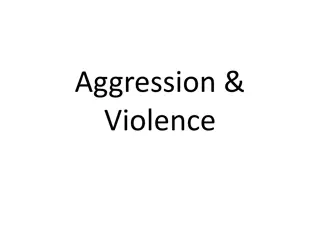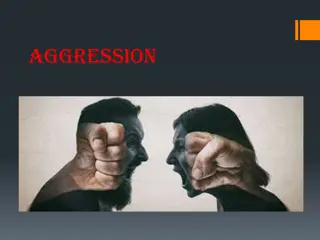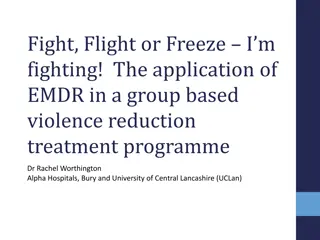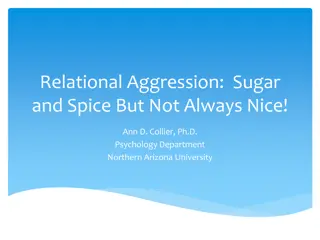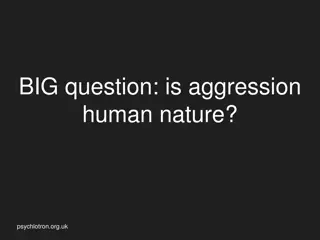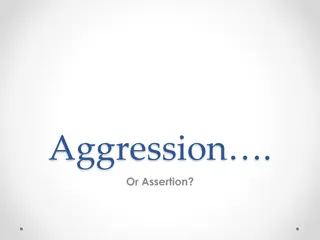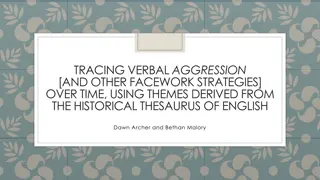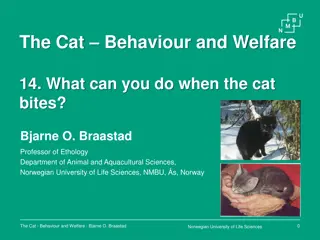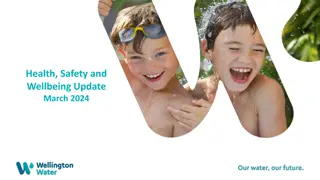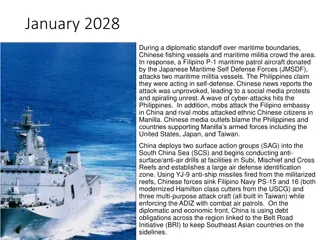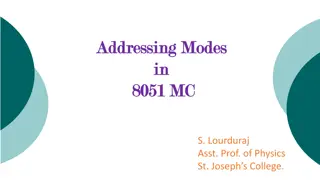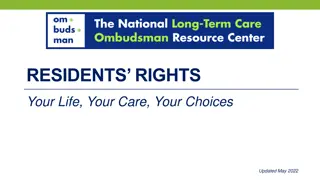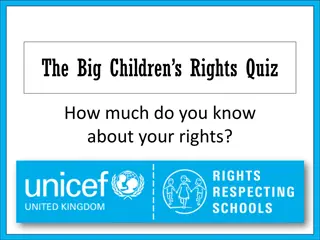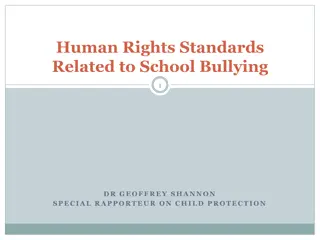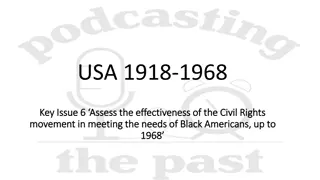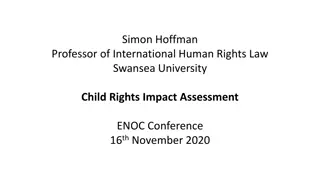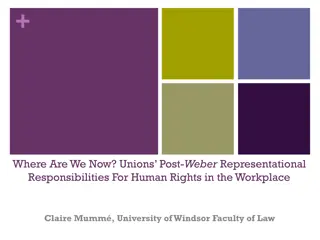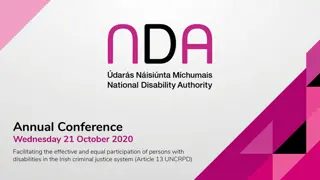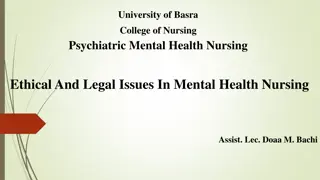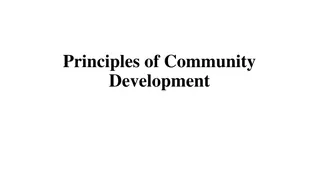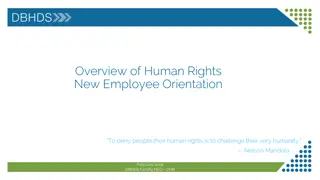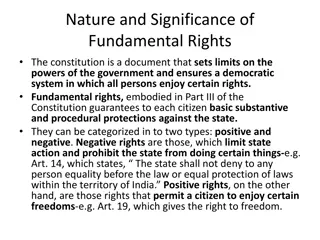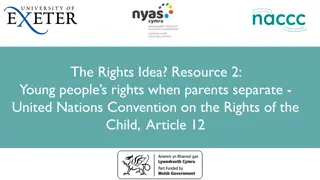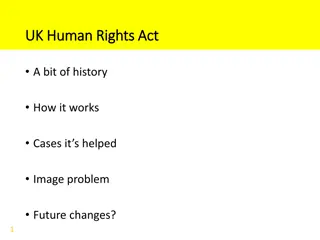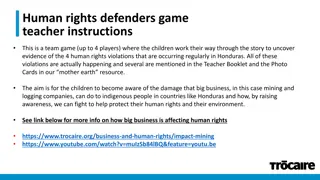Addressing Challenges in Community Rights and Development Aggression
The problem highlighted is the improper lensing of rights in communities, leading to aggression and knowledge gaps. Communities often do not engage due to cultural differences, political pressure, or corrupt practices. There is a lack of transparency and information availability in development projects, hindering progress. The interconnected triple baseline involving community rights, environmental protection, and sustainable development must be carefully addressed to foster cohesion and empowerment.
Download Presentation

Please find below an Image/Link to download the presentation.
The content on the website is provided AS IS for your information and personal use only. It may not be sold, licensed, or shared on other websites without obtaining consent from the author. Download presentation by click this link. If you encounter any issues during the download, it is possible that the publisher has removed the file from their server.
E N D
Presentation Transcript
Key aspects of the problem COMMUNITY IMPROPER LENSING OF RIGHTS AGGRESSION KNOWHOW GAPS DEVELOPMENT KNOWLEDGE AND Communities, caught in systems they do not understand or have much use for are disinclined to engage in them resulting in serious weaknesses in their Aggression is two fold with either political pressure or corrupt practices or both contributing to significant violation of the social, economic and environmental rights of abilities to fight for their rights In most instances the reading of the issue of rights with respect to communities steeped in cultural traditions and customs as opposed to rules, regulations and laws is either astigmatic, myopic or hyperopic communities SAFER MUST ADDRESS THESE WITH UTMOST CARE THE INTRINSICALLY THE INTRINSICALLY INTERCONNECTED INTERCONNECTED TRIPLE BASELINE TRIPLE BASELINE
Improper lensing of rights The right to ownership of shared commons Residents along rivers STRONG SOCIAL INSTITUTIONS CREATE TO CREATE AT THE GLOBAL LEVEL State and Provincial Regulatory Officials THAT USE SEGREGATED RIGHTS APPROACHS rain THAT ARE SUPPOSED TO LEAD TO A The right to non impoverishment Clouds and Insects and microbes Environmental protectionists Access and benefit sharing of area bio-assets Shrubs and trees Social tourism entrepreneurs Free, Prior Informed consent of IPLCs in the use of area biodiversity COMMUNITY RIGHTS Rivers and streams Mainstream tourism establishments NO CONSTITUTIONAL GUARANTEES Mountains and valleys NO TRUST AND/OR NO ACCESS TO LEGISLATIVE INSTRUMENTS Birds and beasts Recognition as first investors in any and all development projects in the area Local government officials WEAK SOCIAL INSTITUTIONS RESULT IN RENDERS HOWEVER, DUE TO ASTYGMATISM, MYOPIA AND HYPEROPIA AS WELL AS CONDITIONALITIES operators within the KCF THEIR ENFORCED IMPOSITION DESTROYS RURAL COMMUNITY COHESION LEADING TO SEGREGATED RIGHTS UNUSABLE NO TRUST AND/OR NO ACCESS TO ENFORCEMENT AGENCIES Illegal and legal Area business people The right to establish IPLC livelihood environs and conditions without outside interference and/or pressure NO TRUST IN, AND/OR, NO ACCESS TO INFORMATION Area CSOs Tourists Socio-environmental conservationists LIMITED ACCESS OR NO ACCESS TO FINANCE
Development aggression THE VOICES THE ISSUES Lack of transparency or information availability on spatial mapping and physical planning Philippine Activists, Human Rights Day 1994 Development aggression called new form of human rights violation International Day of the World's Indigenous Peoples 2013 Aggressive use of enforcement agencies to quell dissident voices We call to stop any development aggression in our lands and territories as it kills every aspect of our life given by our ancestors that is treasured for the next generations. Our customary laws and governance on our lands and resource use and our inherent right to free, prior and informed consent must be recognized and respect by the government, institutions and companies Corrupt practices of state officials and business people in areas such as land use / land grab, provision of IEEs and EIAs for development projects Target 13: Kunming-Montreal Global Biodiversity Framework 2023 Manipulative or aggressive use of political and/or financial pressure to engage in bio-piracy Take effective legal, policy, administrative and capacity-building measures at all levels, as appropriate, to ensure the fair and equitable sharing of benefits that arise from the utilization of genetic resources and from digital sequence information on genetic resources, as well as traditional knowledge associated with genetic resources, and facilitating appropriate access to genetic resources, and by 2030 facilitating a significant increase of the benefits shared, in accordance with applicable international access and benefit-sharing instruments. Absolutely no recognition or regard for the value of citizen science No proper mechanism to address ABS
Community knowledge and knowhow gaps THE ISSUES THE RESULTS Communities inadequately prepared to execute responsibilities as a precursor to advocating for rights Despite mostly common environment related goals, there is either silo action or outright conflict between and among communities and stakeholders / claimholders IPLCs unaware of the ways in which they can exercise environmental rights in terms of community rights as part of overall human rights International networking, negotiating for fund tapping are almost non-existent Woeful inadequacies among local and national state officials and local authorities on local laws and global covenants nor their potentials for positive action Regulators have lost sight of their primary mandates and defaulted to being policing agents Reactive, sensationalist non-investigative mainstream and social media action that has the opposite effect to the one intended Inadequate investigation, insufficient diplomacy and lack of negotiating skills among the communities, stakeholders and claimholders Very limited capabilities to take qualified, evidence based decisions Absolutely no record keeping either among enforcement agencies or other stakeholders on environment related problems, issues and violations Zero ability to engage in collective action with respect to environment and human rights and responsibilities Very poor use of basic digital technologies reducing networking capabilities
The solution strategy Identify socioeconomic and environment issues of the target terrain Identify intra-communal dynamics of engagement in the target terrain UNDERSTAND! Determine knowledge and knowhow gaps of the communities Identify external parties and dependencies impacting programming Create coaching and engagement strategy and curricula for SAFER Cascade Trainers Media Regulators Watchdogs IPLCs Enforcers Local authorities State officials Journalists COACH! Webs Cellphones, video and audio equipment ARM! Social media groups, accounts and pages Online apps Data acquisition Incident response Watchdog nets ACT! Media leveraging Community action Advocacy Response tracking Journalism Diplomacy / dialogue Triple triangulated monitoring of terrain action MONITOR! Impact monitoring of VVR/KCF and national engagement


